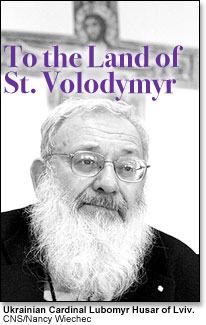 |
 |
|||||
 |
 |
 |
 |
SPECIAL CONTRIBUTOR Most elderly men with serious health problems are content to stay home, watch television and read the newspapers. But John Paul II is still a “man on the move” and the most widely traveled pope in history. Although it appears that his journeys are no longer quite as frequent and wide-ranging, they have by no means ceased. In May he went to Syria and now he heads for Ukraine, visiting both Lviv in western Ukraine and also Kiev, the capital of this rather recently independent country. In Lviv, the center of the Ukrainian Greek Catholic Church and formerly a part of Poland, he will certainly be greeted by thousands of cheering members of both the Greek- and Latin-rite Catholic Churches. Each is now led by a newly created cardinal. Both the Greek (or Eastern)-rite Christians, who reunited with Rome at the 1596 Union of Brest, and the Latin rite faithful (mostly Polish) suffered greatly under communism. Their churches and other properties were given to the Orthodox. A farcical synod was organized which absorbed the Greek-rite Catholics into the Orthodox Church, which the Soviets felt they could control. Clergy and laity who objected were sent to labor camps where many died. Their story is one of modern martyrdom. When Ukraine became independent and for the first time in 74 years there was freedom of religion, the Orthodox were reluctant to return church property to Greek-rite Catholics. There were severe tensions, highly strained relationships and some unhappy (and not very Christian) encounters. It would seem that the atmosphere has become less toxic. The pope’s visit will be a show of solidarity with people who have suffered much and remained loyal. It promises to be a festival of happy Catholics eager to display their affection for a Slavic pope. He will, no doubt, speak in both Ukrainian and Polish and will be invigorated by a powerful emotional response from the people. His stay in the Ukrainian capital of Kiev will, be a different matter. The city is of enormous importance in the history of Slavic Christianity. It was here in 988 that Prince Volodymyr of ancient Rus, encouraged by his grandmother Olha, led his people into Christianity. (In Russian they are called Vladimir and Olga.) Thousands of his subjects followed him down into the Dnieper River to be baptized and become members of the one church, which would not be divided into Catholic and Orthodox until 1054. Later, the political and ecclesial power center would shift to Moscow, but Kiev would keep its many memorials to its historic importance as an ecclesiastical center. However, there is only one Catholic church in the city. The rest are divided among three different Orthodox denominations, with those still loyal to the patriarch of Moscow being the most numerous. Some belong to a group that recognizes only a Ukrainian bishop and reflect the strong nationalist and anti-Russian feelings of many people. Will the pope be welcomed by any of the local bishops? Alexei II, patriarch of Moscow, has made it clear that the bishop of Rome is not welcome. But the Vatican is ignoring his feelings with a papal visit to Kiev in Ukraine. The pope will certainly visit the great cathedral of Holy Wisdom with its astonishing mosaic figure of the Mother of God. But this huge church is now a museum and therefore neutral territory. But what of the most important of all Christian sites in the city, the famous and very ancient Monastery of the Caves? It is the property of the Russian Orthodox Church and its monks are loyal to Alexei II. Will the pope be greeted by its abbot and taken through its underground passages where hundreds of holy monks are buried? For many years now it has been Vatican policy to be extremely careful of Orthodox sensibilities. The pope is undoubtedly interested in a visit to Russia but the Russian Orthodox bishops have not been interested in having this charismatic Catholic as an honored guest. However, Rome may now realize that, in spite of papal acts of contrition, Orthodox pardon has not been granted. Memories of Catholic Crusaders running amok through the streets of Constantinople, the rapes and thievery of 1204, are still vivid in Orthodox minds. Catholics are perceived as heretics, proudly and unilaterally proclaiming new dogmas and canonizing saints. Reunion is not near. And the cause of ecumenism may not be served by what is perceived as docility and weakness. The new Vatican strategy seems to be—if the pope’s wanderlust leads him to Orthodox lands with uncooperative and frosty hierarchies, then so be it! Jabusch is director of Calvert House, the campus ministry at the University of Chicago. Front Page | Digest | Cardinal | Interview |
||||||||
